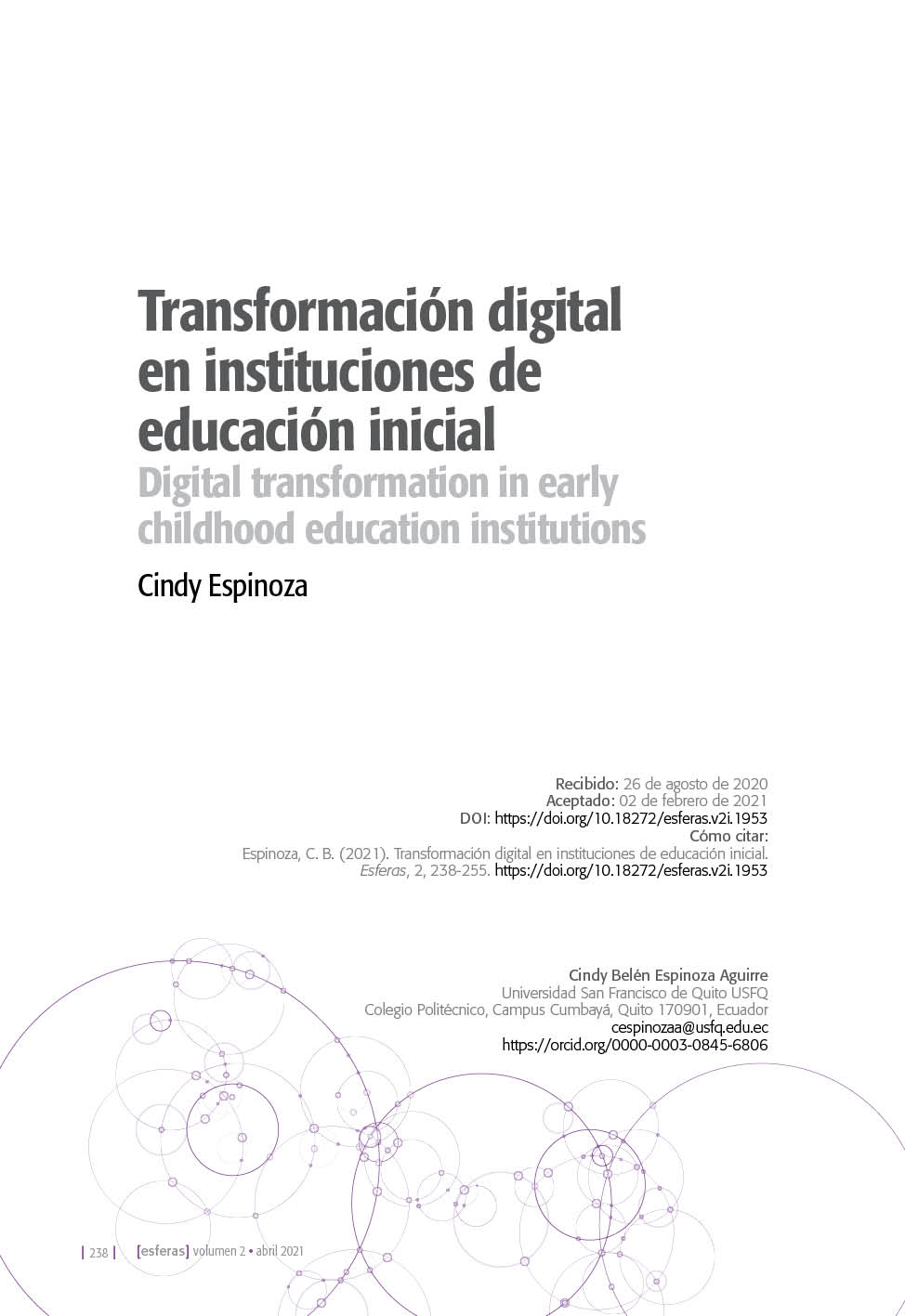Digital transformation in early childhood education institutions

Published 2021-04-06
Keywords
- quality education,
- digital transformation,
- e-learning
How to Cite
Abstract
Education is one of the most powerful and proven engines to guarantee sustainable development. In this sense, the project "Digital transformation in early childhood education institutions" (TDEI) was created and implemented one year ago in the Children"™s Center of Fatima. The TDEI project has incorporated into its curriculum the teaching of the use of LMS platforms, repositories, material available on the web, and office automation programs.
Since the institution adopted the digital transformation, it has been able to maintain the classes of the 2020 period in a completely digital environment, benefiting the students, teachers, administrative staff and parents. Consequently, it has contributed to understanding how to use digital tools promoting discussion, debate,guided practice, and mastery of hybrid learning in children and teachers. This is shown in the results of qualitative research, through in-depth interviews as well as surveys that were applied at the end of each module. When tabulating the results, a 98% satisfaction was obtained, considering four key indicators: quality, application of what was learned, content of the curriculum, and usefulness of the material delivered. In this sense, the TDEI project has benefited 200 people directly and indirectly.
Downloads
References
- Unesco. (2013). Liderar el ODS 4 - Educación 2030. Recuperado de: https://es.unesco.org/themes/liderar-ods-4-educacion-2030.
- Unesco. (2017). Educación para los Objetivos de Desarrollo Sostenible: objetivos de aprendizaje. Recuperado de: https://unesdoc.unesco.org/ark:/48223/pf0000252423
- Tarabini-Castellani, C. (2020) Educación, pobreza y desarrollo: Agendas globales, políticas nacionales, realidades locales. Barcelona, España: Universitat Autònoma de Barcelona. Departament de Sociología.
- Cepal. (2020). La educación en tiempos de la pandemia de COVID-19. Recuperado de: https://repositorio.cepal.org/bitstream/handle/11362/45904/1/S2000510_es.pdf
- PNUD. (2020). COVID-19 y Objetivos Mundiales. Recuperado de: https://feature.undp.org/covid-19-and-the-sdgs/es/
- Morán, M. (2020). Educación. Desarrollo Sostenible (28 de septiembre). Recuperado de: https://www.un.org/sustainabledevelopment/es/education/
- UNESCO. (2015). La educación transforma vidas. Recuperado de: https://es.unesco.org/themes/education
- Lab XXI. (2020). El reto de transformar la educación durante una pandemia. Recuperado de: https://www.lab-xxi.com/el-reto-de-transformar-la-educacion-durante-una-pandemia/
- Telesur. (2020). ¿Cómo impacta la Covid-19 en el cumplimiento de los ODS? Recuperado de: https://www.telesurtv.net/news/coronavirus-impacto-objetivos-desarrollo-sostenible-onu-20200706-0054.html
- Torres, A. (2010). La política pública de seguridad ciudadana en Quito: Un esfuerzo municipal. Urvio. Revista Latinoamericana de Seguridad Ciudadana 9. Recuperado de: https://doi.org/10.17141/urvio.9.2010.1135
- Ignite. (s.f.). La transformación digital de la enseñanza, en la era post COVID-19. Recuperado de: https://igniteonline.la/la-transformacion-digital-de-la-ensenanza-en-la-era-post-covid-19/
- Fundación Entrega Ecuador. (2020). Fundación Entrega Ecuador. Recuperado de: http://fundacionentrega.org.ec/
- PNUD. (2020). COVID-19: El desarrollo humano va camino de retroceder este año por primera vez desde 1990. Recuperado de: https://www.undp.org/content/undp/es/home/news-centre/news/2020/COVID19_Human_development_on_course_to_decline_for_the_first_time_since_1990.html
- ONU. (2016). Objetivos de Desarrollo Sostenible. Recuperado de: https://academicimpact.un.org/es/content/objetivos-de-desarrollo-sostenible
